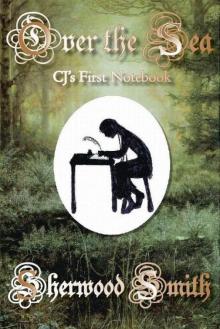- Home
- Sherwood Smith
Fleeing Peace Page 10
Fleeing Peace Read online
Page 10
That man in charge thinks I’m a weak, silly, boring little girl. Good!
So . . . to get away, she had to not be a girl. And the one she looked most like was the youngest of her brothers.
She whirled to the battered chest that she shared with Marga. Their sewing basket was neatly laid on top of the two piles of folded clothes—and in it was scissors. She picked them up, looked at her braids, and hesitated.
Angry with herself for that hesitation, she crept out of her room and peeked over the stair rail. The fog warrior sat in a chair by the door, staring straight ahead.
Where was the other one? Liere didn’t want to waste the time sitting down and searching, and then having to splat back into first-face and recover. Maybe he was only going to get some lunch, but one thing she knew: she had better be fast.
She sped to her brothers’ room, and ransacked the trunk the two youngest boys shared, finding old, worn winter clothes underneath. First, a sturdy pair of wide-legged drawstring trousers that had been passed down through the four brothers, loose enough to fit all. A warm tunic, a very battered pair of shoes that had been handed down, like the clothes, by all the brothers in turn. The shoes were much too wide, but extra stockings would take care of that.
She repacked the trunk, closed it, and crept out again, pausing next to the wall. Using her mental ‘finger’ she touched the minds of her family, checking their locations. Her father and mother and the two eldest were eating lunch. They would go to the store soon. The younger ones were still out doing chores.
She must act now, before they returned.
In her room she took her own clothes off, and packed them at the bottom of the trunk she shared with Marga. Then she pulled on her brother’s clothes. They were close enough in length, though roomy in width.
She picked up the scissors and cut her braids off just behind her ears, hating herself for the regret that suffused her at each grind of the scissors. She cut the back by feel, parted her hair down the center like the boys did, pushing the longer top part back behind her ears.
She replaced scissors and basket, then hid the hair under the trunk—using all her strength to tip it back—and last, she pulled from under the mattress the little bag of coins that she had been saving ever since she was very small, to buy books when she got old enough.
The coins vanished into the pocket of the trousers. She walked back and forth, noticing how different clothing made her move differently—and then she heard creaking on the stairs. Her next oldest brother walked up, not running with his usual thundering clatter, but slow and deliberate, like Father. She waited, her heart thumping harder. She touched his mind. Knowing people had always made thoughts easier to touch, in fact sometimes it was like they pushed their thoughts at her, like her mother had, without knowing. But he seemed far away, his thoughts all smeary—like seeing through a fog. He trod at that same strange, deliberate pace to their room and changed into his work shirt.
She shoved her feet into the big shoes and forced herself to wait until her brother had reemerged. He walked downstairs without a backward look. Matching his steps, she followed, daring to let the shoes clatter. Her brother did not notice.
She didn’t give the warrior a glance, hoping he could not see her heart hammering directly under her throat. She felt his scrutiny of her older brother—the perception of a boy barely discernable in the fog. Then he glanced at her, and she saw herself in his foggy mind: a scrawny, smaller version of the big boy now going through the kitchen door.
And he permitted her to pass.
Instead of following her older brother to the kitchen she forced herself to walk calmy out the door, and away from her home. The air was cold on her neck, but she liked the freedom of long strides without the hampering weight of a skirt.
Ducking between two houses, she took a circuitous route to Market Street, and there she moved swiftly from shop to shop, using her store of coins. Everyone seemed to think she was her brother, but no one asked questions. They were all foggily polite and incurious.
The coins did not go very far. She bought a second-hand basket, plain but sturdy—not even having to provide her lie about what had happened to the family baskets. She bought a blanket, a second-hand cup, a candle and sparker, at three succeeding shops. In the old days, shopkeepers who knew her would have asked friendly questions—going somewhere? What happened to your grandmother’s cups, did you break one?
No one asked, no one appeared to care. She filled the basket, a few apples here, a loaf of bread there, a whole quarter of cheese, which used up the last of her coins. No one asked nosy questions. No one chatted, unless it was about business.
There was a steady stream of farm folk leaving on the main road, probably a result of the gathering at Town Hall. Liere slipped in among strangers, and made her way down the road until she reached the overgrown pathway leading to Ther Doleh, the great ruined city, reaching it very late in the afternoon.
Legend had it the ruins were ghost-ridden, but Liere had experimented with long distance sensing, and she’d never found any ghosts.
Liere was tired, and her feet hurt from the shoes, from the long walk. As she picked her way among the ruins in the swiftly falling darkness, she wished there were some ghosts. Even lost spirits would be better than no company at all.
No. She couldn’t think like that.
She walked slowly a jumble of weather-worn stones, ducking winter-bare branches of scraggly fruit trees, and sat on a moss-covered block of stone.
She was here because no one would think to search these ruins. Though some people scavenged brick and stone, most people (like her parents) disapproved of that practice. It was a good place, a safe place, to listen from second, to learn, and to wait for the Guardian to answer her mental call.
It might not be tonight. It might take days. But Liere knew she would, and then Liere could tell her what had happened, and ask how she could break Siamis’s spell.
Until then she would practice searching, for Siamis had shown her that distance was no drawback in the mental realm. Liere would practice that, and practice her second-face wall, what that horrible Siamis had called her mind-shield. One did not need to be a strong grownup to have a strong shield.
She hefted her basket, making her way to the rubble-choked center of the city. And there, under one of the buildings, she found the old escape tunnel—just like in the stories.
She lit her candle, made her way downward, and found herself in a vast cavern with water dripping forlornly at one end, trickling over a mossy stone trough to a silent stream. The cavern smelled damp, of wet stone, but it was a little less cold than the wintry night above.
She kept moving—and saw faintly glowing globes at intervals, left over from the days when magicians lived in this part of Imar. Presently she knelt at the stream, removed the little cup she’d bought, dipped it, and drank greedily. The water was so cold her teeth ached, but it tasted good.
She put her candle and basket down on a fallen column, and unpacked the thick wool blanket. She wrapped it around herself and then she sat beside her basket.
The silence was broken only by the tuneless drip of water, faintly echoing.
Homesickness made her eyes burn, but she angrily squelched the emotion. Home had once meant security and safety, but it had also meant pretense and enforced ignorance of the world. The first two were gone, wiped out by Siamis’s spell. The second two were also gone, now that she was free.
Free.
She blew out her candle and lay down to sleep, listening to the slow, rhythmic drip of moisture echoing off ancient rock.
This lullaby accompanied her dreams.
Chapter Ten
Norsunder’s temporal base, where Senrid was held prisoner, lies south of Sartor’s border. In the center of Sartor is the forest called Shendoral.
Its peace was disturbed when the air glittered and a girl named Jenel Sandrial plumped down hard after a long magic transfer. When the magic-transfer dizziness passed off, she s
tood up shakily and looked around.
This had to be Sartor, and apparently winter had not yet arrived. How was that possible? Yet here was no snow on the springy moss, and the air was cool, not cold, and smelled of wood and water and loam. Birds chirped and sang, their songs unfamiliar, overhead. Looking at moss-covered trunks and long spreading leaves, Jenel wondered if these trees were cousins to those at home, just like the people were. The forest was different from that in Everon’s midlands, but it was beautiful.
She brushed herself off, then shook out her heavy woolen dress. I’m really here, she thought, looking up at darkwood branches overhead, the crinkly five-fingered leaves of amber, rust, and gold. I am in Sartor! She—an upper housemaid from the falling-down shambles of a royal palace in Everon—was really, truly, in Sartor, center of so many old songs and stories.
But she had to save her best friend Cassandra! Every moment she looked around was a waste of time, and so she began to walk, choosing a gentle downhill slope as she gazed at light-shafts and grottos and unfamiliar blossoms growing peacefully in sunny places. Unseen birds sang, and the rustle of hedges and berry-heavy plants indicated the presence of small animals. How Cassandra would love this place!
A flicker of color caused her to touch her sash, where she’d carefully set Cassandra’s magic-silver hatpin. It kept its shape, so there was no danger.
A moment later a girl her own age stepped around a dark green shrub with tiny bell-shaped blossoms and smiled a welcome. She had blue-tinged skin and very long curling fair hair that hung well below the ragged hem of her knee-length cotton tunic.
She’s not human, Jenel thought. Or maybe not quite.
“Welcome,” the blue girl said. “Who are you?”
Jenel said proudly, “Jenel Sandrial, from Everon. Ah, what language am I speaking?” For she said her words in Fer Sartoran, but they came out sounding differently; the two languages seemed to slide together in her mind—painlessly, easily—and become one.
“Sartoran.”
“Magic,” Jenel breathed. “Who are you?”
“Aroel Merewen—but just call me Linet. All my friends do.”
“Friends?” Jenel repeated.
Linet danced a step or two, laughing soundlessly. “I have many, when I am in my human form. So. How can I help you?”
“Please,” Jenel said anxiously. “My best friend got taken to that Norsunder place and I’m here to free her, if I can. Those from Norsunder were after her, or maybe they were after this.” She touched the silver pin in her sash, its head carved to look like a feather or leaf. “The Guardian’s hatpin. It’s magic—it grows into a sword if they come near. Anyway, we ran, but eventually that terrible Detlev caught up with us, and they took Cassandra away.”
“He left that behind by accident?” Linet pointed at the hatpin. She made a face. “Doesn’t sound like Detlev.”
“No, he made her drop it, and then he kicked snow over it. I was there, you see, but hiding. After they disappeared I found it and took it away, in case they planned to come back for it.”
Linet frowned. “There’s probably magic on your hatpin that causes grief to Norsundrians if they touch it. I’ve heard of such things being made, back in ancient days. But why did they take your friend, if they only wanted to prevent her from using the Guardian’s hatpin?”
Jenel wrung her fingers together. “Why indeed? It makes no sense! Cassandra doesn’t know anything—”
“Ah. If there was no specific reason,” Linet said seriusly, “then it has to be the same reason they’ve been harassing boys and girls all over the world. The reason is yet unclear to anyone. They seem to be looking for someone particular, and maybe your Cassandra is it. Did they see you?”
“No. I hid. How could I stop a whole gang of them?”
Linet waved a small hand, her fingers reminding Jenel of a bird. “Stop Detlev? Of course not! You did right, and so your friend will say when she’s free. What matters right now is that you’re doing what you can do.”
Jenel nodded soberly. “You mean, not waiting for someone else to help.” Inside, she braced herself: she was terrified at the idea of making her way to the Norsunder base to search for Cassandra on her own, but what other way was there?
Linet smiled. “Too many people in the world have gotten into the habit of waiting for the magicians to rescue them from their messes.” She added when Jenel looked frightened, “But that doesn’t mean that one shouldn’t ask for help when it’s needed.”
Jenel remembered the Guardian having said something similar. Maybe the rest of the world was in trouble because it waited for someone else to solve its problems, but she couldn’t do anything about that. “I need to know how to get into the Norsunder place,” Jenel said firmly, hoping she didn’t sound as afraid as she felt. “Can you tell me?”
Linet shook her head. “You can’t get in and out of the Norsunder base, even with your magic hatpin. But I’ll take you to Eidervaen—that’s the capital—and we’ll see what the queen says.”
Jenel sighed, rubbing her hands with nervous anticipation.
Linet said, “Since we’ve got a bit of a walk ahead of us, why don’t you tell me more about Cassandra, and how the two of your managed to catch the notice of a nasty monster like Detlev?”
Jenel drew in a shuddery breath of relief. “Cassandra is half dawn-singer, and she’s on Detlev’s enemy list because she helped break his horrible enchantment over Everon. See, she was put in place of the real princess—that’s Hatahra—when she was little, and I was the upper housemaid in the palace, and assigned to Cassandra. The Sandrials are at least as old a family as the Delieths, and we’ve always taken care of the palace . . .”
The story that unfolded as they walked through the forest was a typical piece of twisted knavery—characteristic of Detlev, Linet thought. Why did he always do horrible things to royal families, especially ones with children? Why torture them with ugly magical ‘experiments’ instead of outright war? Obviously because he found it much more entertaining than the predictability of general slaughter.
Jenel talked with more and more freedom as their walk led them along old, sun-splashed paths. Linet began to see the people involved, perhaps not as Jenel wanted them to be perceived. Jenel’s loyalty was that of the generous-hearted: unquestioning, devoted, active even to the cost of her own life. She obviously admired the Delieth heirs, and she had become the friend of Cassandra, who was for so long the putative princess instead of living with her wandering relatives in Everon’s forestland.
Yet after the twentieth “Cassandra says,” Linet formed an image of a difficult, moody girl who’d done well enough with judicious help from the Guardian, but who was unlikely to escape from Norsunder’s base on her own. Why Detlev would want someone like that was impossible to guess.
The Loi, who watched ceaselessly toward the south where the Norsundrian temporal Base lay, had overheard some patrollers gossiping about guard duty, and a troublesome boy they couldn’t get rid of because he was Detlev’s personal prisoner. Even Norsundrian rankers wondered: what does Detlev want with kids?
Linet led Jenel to a little pool for a drink, then said, “I will take you to Ystnesveas.”
The queen of Sartor! Jenel braced for the vertigo of transfer magic, but didn’t feel it at all this time. A mild swooping sensation shivered through her, blurring her vision, then she found herself in a small, pretty room.
Jenel wondered if they were in Rive Dian, probably the oldest building in the entire world, so famous that every child who listened to any history knew something about it. She looked about her with a fascinated gaze, expertly assessing and approving what she saw, from the well-cared-for ancient furnishings, murals, and art pieces, to the newer ones, all chosen to complement the old. Aged parquet floors in the residence wing had been buffed smooth over many centuries. Rugs with patterns favored by ancestors had been patiently rewoven by expert hands.
A well-ordered palace, in her view, bespoke orderly rule. There had
been neglect during the ugly days of the enchantment at home in Everon. Jenel decided that Detlev not only had to live in squalor and gloom, but probably—for some weird reason—preferred it. Or why would he be a villain? Nobody who liked order could be evil, surely. And just as surely, evil would treasure squalor and chaos.
“I’ll take you to her favorite morning chamber,” Linet said. “It’s the most comfortable—and private.” So saying she led Jenel into a small but well-proportioned room, sunny and airy. Armchairs waited. Jenel admired the rolled arms, the curves of the back that would accommodate wide skirts.
She sat nervously on the very edge of a satin cushion, aware that her heavy winter-gown was dusty and mud-splattered.
A white-haired figure entered without ceremony. Jenel tried not to stare at the milk-colored skin that showed the blue of veins beneath, the talon-like fingernails and toenails, the blue-white drifting hair. She looked away; she’d never been this close to a morvende. The cave dwellers seldom came to the world’s surface, and most of those she had glimpsed kept their cave-pale skin covered up, and their feet and hands hidden in the complicated folds of their clothing.
The morvende boy grinned at Jenel as he jumped up to sit on a carved cabinet, his bare legs swinging below the edge of his exquisitely woven tunic. He picked up a book. His lips moved slowly: he was learning to read.
A tall girl of about fifteen or sixteen entered. She had very long brown hair and a face—the slightly protruding, droopy under-lidded eyes especially—that bore a distinct resemblance to King Berthold and Princess Tahra. Her gown was midnight blue velvet. Jenel realized she was in the presence of Yustnesveas, the queen of Sartor, and she bounced to her feet.
Linet introduced everyone with a lack of formality that Jenel found both reassuring and intimidating. Her anxiety nerved her to meet Yustnesveas’ kind and friendly gaze, and she relaxed enough to tell her story again.
Linet perched on the arm of one of the chairs. When Jenel paused, looking in appeal from one to the other, Linet said, “Hinder.”

 Inda
Inda Danse De La Folie
Danse De La Folie King's Shield
King's Shield Whispered Magics
Whispered Magics Fleeing Peace
Fleeing Peace Barefoot Pirate
Barefoot Pirate Crown Duel
Crown Duel Mearsies Heili Bounces Back
Mearsies Heili Bounces Back Commando Bats
Commando Bats A Stranger to Command
A Stranger to Command Lhind the Spy
Lhind the Spy The Spy Princess
The Spy Princess Blood Spirits
Blood Spirits Sasharia en Garde
Sasharia en Garde Lhind the Thief
Lhind the Thief Paradise Drift
Paradise Drift Banner of the Damned
Banner of the Damned The Trouble With Kings
The Trouble With Kings Poor World
Poor World Treason's Shore
Treason's Shore Wren Journeymage
Wren Journeymage A Posse of Princesses
A Posse of Princesses Revenant Eve
Revenant Eve Once a Princess
Once a Princess Time of Daughters I
Time of Daughters I Rondo Allegro
Rondo Allegro Coronets and Steel
Coronets and Steel Over the Sea
Over the Sea Senrid
Senrid Hunt Across Worlds
Hunt Across Worlds A Sword Named Truth
A Sword Named Truth The Fox
The Fox Twice a Prince
Twice a Prince Fair Winds and Homeward Sail: Sophy Croft's Story
Fair Winds and Homeward Sail: Sophy Croft's Story Time of Daughters II
Time of Daughters II The Rifter's Covenant
The Rifter's Covenant The Phoenix in Flight
The Phoenix in Flight Stranger
Stranger The Thrones of Kronos
The Thrones of Kronos A Prison Unsought
A Prison Unsought Twice a Prince: Sasharia En Garde Book 2
Twice a Prince: Sasharia En Garde Book 2